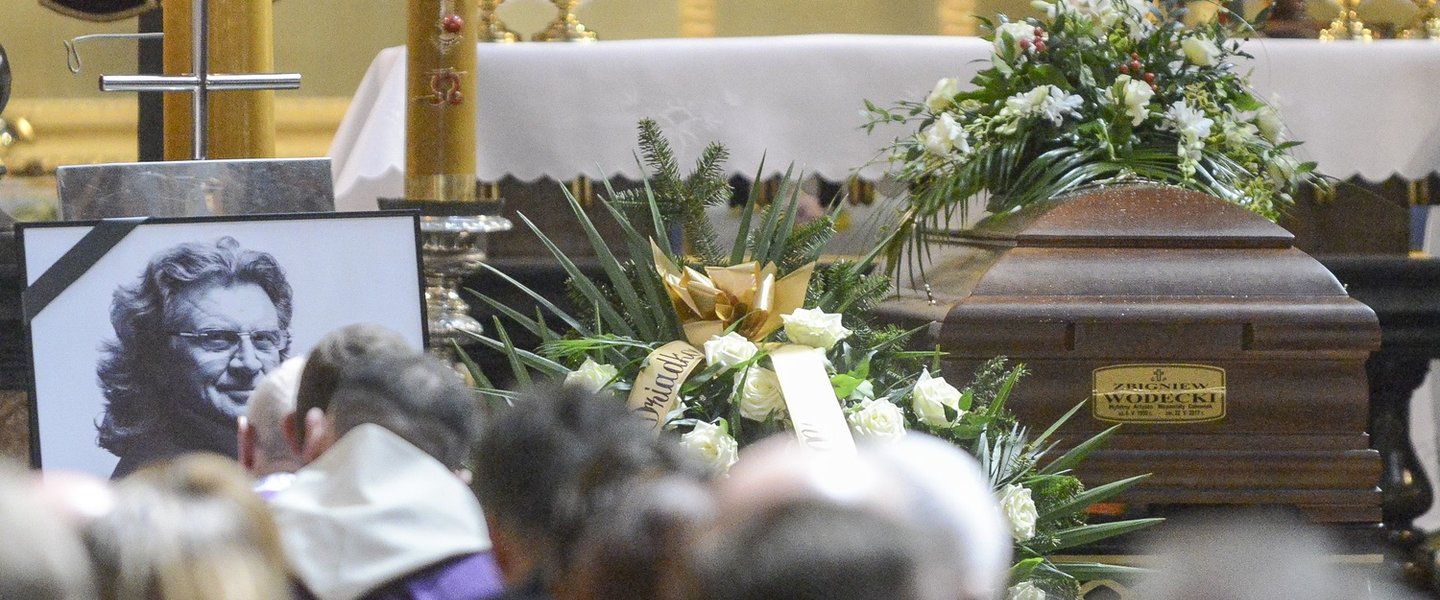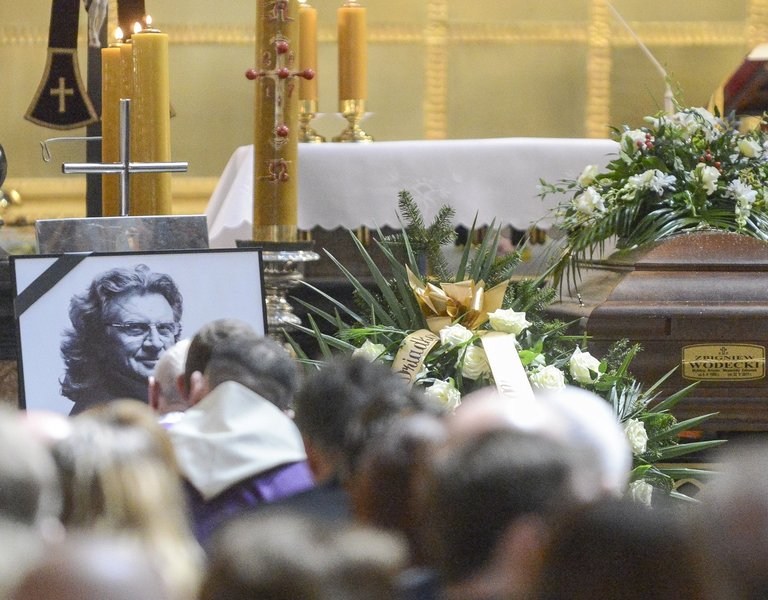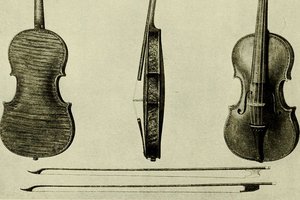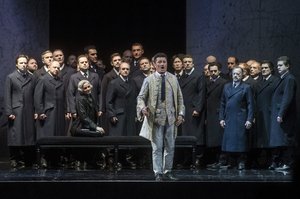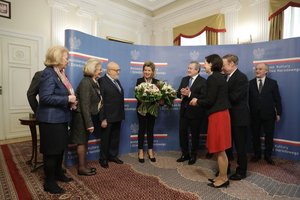Zbigniew Wodecki: Cross-generational idol with a perfect pitch
Years before many had heard of Luciano Pavarotti and world-wide crossover projects, Zbigniew Wodecki was already combining pop with classical music. He felt equally at home at the philharmonic, in a dance routine or on the stage of an Open'er or Off Festival.
The defining point in Wodecki's biography could be 1985. Martial law, which the communist regime had declared to crush the independent Solidarity movement, was ending, but Poland was still in a mournful stupor. The underground “Solidarity” movement was continuing its resistance but the enthusiasm had clearly faded. Thousands of Poles emigrated. Communist propaganda headed by Jerzy Urban, provided Poles with ersatz topics. Issues such as nudism and porn got hashed over on television discussion shows and in other media.
Somewhere along the peripheries of those developments like a there appeared, like a brilliant comet, the song Chałupy Welcome To. Wodecki had received a composition with great hit potential from Ryszard Poznakowski of Trubadurzy. He made a video without knowing that, thanks to Blue Box, his parodic dance performance would be illustrated with photos of a nudist beach. When Wodecki landed in America, the biggest hits of the day were video cassettes with Ryszard Bugajski's film The Interrogation, banned by the communist censors, and his video.
Already in 1979, the musician had won widespread popularity when he performed the theme song for the television cartoon show Maya the Bee. With those two television hits, he had ensured himself a pension down to the bitter end.
Now came the biggest surprise. It is 1985. Andrzej Wajda is filming A Chronicle of Amorous Accidents depicting the last days of the Second Republic of Poland, its sensuality, volatility and fragility. The film was extremely important because it was Wajda's tribute to Tadeusz Konwicki. The outstanding writer, enveloped by an aura of anti-communist opposition, was blacklisted by the regime and could not get his works officially published, but had the pleasure of listening to Wojciech Kilar's film score. It could not get any better. Konwicki, Kilar and Wajda were first class acts. These three masters decided to include two hits of that era, Ta ostatnia niedziela (‘Last Sunday’) and Jesienne róże (‘Autumn Roses’) in the film portraying the eclipse of the 20 year-long interwar period. They also decided that Zbigniew Wodecki should sing them.
Many Poles regarded Wodecki as a musical mercenary, regarding his pastiche Chałupy Welcome To literally as a bit of dance-music trash. But the creators of A Chronicle of Amorous Accident saw in Wodecki someone personifying great musical culture and the charm of the interwar era. He wore a dinner jacket with the same grace as the pre-war café crooner Mieczyslaw Fogg or a symphony musician, which Wodecki had indeed been a decade earlier.
We thus have the portrait of a multi-faceted artist with all his contradictions and magnificence. For Wodecki was not someone who could easily be pigeon-holed. A classic seeking his place in the modern world of pop music and enjoying the good life. As he put it, his monthly mobile phone bill alone was equivalent to what his full-time philharmonic musician colleagues earned each month.
In Wodecki's biography, there were more contradictions and dualities. In Dancing with the Stars show, he displayed his appreciation for this new type of entertainment but also formed the ideal couple with former land owner, countess and actress Beata Tyszkiewicz. His artistic image was enhanced by his expressive facial features, underscored by his spectacles and topped with a lion's mane of a hairdo. For Wodecki knew that an artist must project an artistic image. But, unlike those who only looked good and are created by producers, he himself was highly creative.
In their CVs, no-one else could boast of a classical education, playing in Marek Grechuta's classicist group Anawa and Ewa Demarczyk's Theatre, nor an impressive record début with Wojciech Trzciński. It was he who years later gave him recognition amongst the younger generation's most talented, aspiring musicians. The Mitch&Mitch Orchestra approached Wodecki with a proposal for a concert paying tribute to his 1976 vinyl recordings. And for those new versions last year he won two Fryderyks (Polish Grammys), defeating all the young artists of the young generation. He also lucked out. He was presented the award statuette by none other than Jean-Michel Jarre.
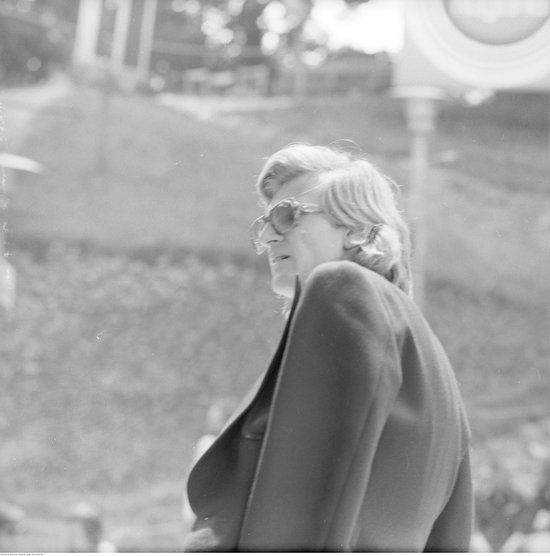 Family music-making
Family music-making
Marek Grechuta once approached a skinny red-head and asked whether he plays the violin, asking him if he plays the violin. “I do indeed,” he replied. “And would you happen to have a female friend who plays the viola?” “I do,” came the reply. That skinny red-haired kid was Zbigniew Wodecki. The viola player was Anna Wojtowicz, later immortalised by a popular Skaldowie hit. They played together on the 1970 Marek Grechuta & Anawa record which included such unforgettable hits as Niepewność serca (‘Uncertainty’), Będziesz moją panią (‘You Will Be My Lady’) and Nie dokazuj (‘Do Not Be Crazy’).
“When I first met him, he was a 17-year-old pupil of the secondary music school headed by the famous director Juliusz Weber. To his pupils, he was a terror who took great pains to make sure they didn't go astray,” Jan Kanty Pawluśkiewicz recalled.
“It was with Marek Grechuta that we set up our little group called Anawa and realised we must invite genuine musicians. We didn't want to present ourselves with a student accompanying us on piano but rather aspire to more interesting things. That's why Marek visited the music school and, after a short conversation, Zbigniew Wodecki became a member of Anawa. One Krakow guitar player called that acquisition “more than a bull's-eye”, because Wodecki turned out to be a phenomenal musician, violinist and virtuoso, in a single moment, we had created a professional group. We didn't work together all that long, because Zbyszek transferred to Ewa Demarczyk Theatre. Ewa didn’t pay much attention to ceremony and simply told him to come. Such were the hierarchies of Krakow. Wodecki gently apologised to us, although we did not hold it against him. We were glad to have had the opportunity to meet him. We ran into him in the Piwnica pod Baranami (cellar club). By then Wodecki was touring the Parises and Berlins of the world as well as half the globe with the Marek & Wacek piano duet and, of course, Ewa Demarczyk. But he also wanted to show off, and I backed him up in that with all my might. It was that desire to show off that launched his great career. Zbyszek was a phenomenon. As a highly competent musical savant, he easily navigated in every genre. He was attracted to the greatest possible explosion of popularity and was able to heartily laugh at himself because of it. He never (stooped) below a certain level and that also applied to Maya the Bee. Wodecki had music in his genes. His father Józef had played the trumpet in the band of the 8th Cavalry Regiment. His grandfather, a coal miner, had been born near Dortmund, Germany in Westphalia. When the family returned to Silesia, his name was spelt the German way: Wodetzky. During the World War, the Gestapo had tried to track down Wodecki's dad to draft him into the Wehrmacht, but he went into hiding and escaped conscription. At the age of 14, Józef Wodecki had received a sword from Marshal Józef Piłsudski as a prize for his equestrian vaulting performance. In the 1950s, he became first trumpet player of the Polish Radio and Television Orchestra under the direction of Jerzy Gert and subsequently – of the Krakow Military District's Song & Dance Ensemble.
His other grandfather, a graduate of the Conservatory of the Music Society in Krakow, had been an organist. According to family legend, he had found his future wife in a nunnery, and that could have been the inspiration behind the hit Panny mojego Dziadka (‘My Grandfather's Girls’). One of those girls, Zbyszek's mother, was a superb coloratura soprano. That vocal talent was shared by a sister, a cellist and soloist of the Krakow Operetta.
Already as a child, Zbyszek had perfect pitch. Starting at the age of five, he attended rehearsals of great renditions of the works of Beethoven, Tchaikovsky and Bach. He then enrolled in a violin class. When his strict father returned from a rehearsal or recording session, he would always check to see whether his son had been playing and practising. His favourite saying was: “The world maintains order and people are kept in line by the whip”.
But in primary school Zbyszek had the reputation of a hooligan. He got expelled from secondary school for playing the Helena Majdaniec hit Jedzie, jedzie pociąg (‘Goes, Goes Train’) on guitar with a group of schoolmates and for throwing out maps. Later on, the great jazz violinist Zbigniew Seifert did precisely that.
Hungarian striptease
Wodecki began performing in public thanks to the religiosity of the Polish people. He played Ave Maria at a Corpus Christi procession and later during church wedding ceremonies. The organist paid him as much as his dad earned in a month. Then things became less religious, as Wodecki turned to dance music climates, foreshadowing such hits as Chałupy Welcome To. As a teenager Wodecki was hired to perform on New Year's Eve in the mountain resort of Zakopane, where he made his début as a drummer. When all the guests were all merry, mellow and more than just tipsy, a beautiful Hungarian dancer performed a striptease specially for him. Being on the bashful side, years later he fondly remembered an incident in Bulgaria, where he and Krzysztof Materna arrived by boat at a nudist beach which they too entered unclad. In the Anawa group or at Ewa Demarczyk's club he felt the most comfortable staying in the background. That helped him mature and get rid of the stage fright which in the past had limited his freedom and self-confidence.
Wodecki began his stage career in earnest with the Czarne Perły (Black Pearls), whose guitar player was none other than Zygmunt Konieczny, court composer of the Piwnica pod Baranami, Ewa Demarczyk and the Old Theatre of Krakow. While performing with the Black Pearls, Wodecki met the vocalist of Izomorf 67, the then very young Krzysztof Krawczyk. Eventually, the pop concert stage brought the two performers together.
With Anawa he performed at the National Festival of Polish Song in Opole, where they won an award for the hit Serce (‘Heart’). Playing with Ewa Demarczyk's group while still in music school, he performed in Cuba. His teacher invited him to a school concert and he replied he was headed for Paris. Today everyone can go there, but back in the 1960s and 1970s, that was a true stroke of luck. The day before Ewa Demarczyk's group was to perform at Paris Olympia, Dalida had been the star attraction. It is no wonder the young Wodecki made his professors envious. Returning from foreign tours, he impressed others with his fancy Western coat and cigarettes.
At the same time, he failed to realise that at Ewa Demarczyk's side, his artistry was suffering. He played the trumpet part in Sur le pont d'Avignon, and performed Rilke's Loneliness in a duet with Demarczyk. In the Ballada o cudownych narodzinach Bolesława Krzywoustego (‘Ballad of the Miraculous Birth of Boleslaw the Wrymouth’), he sang falsetto. Songs devoted to the Black Madonna, written by Zarzycki and Konieczny, required rehearsing. It was only years later that he could record Irena Santor's Embarras the first-time round.
The hit Zacznij od Bacha (‘Start with Bach’) was something more than just literary fiction. He always began a practice session with Johann Sebastian Bach. Paradoxically, his road to classical music led via the pop concert stage. Orchestra conductor Kazimierz Kord noticed Wodecki at an Ewa Demarczyk concert. Under his baton, as part of the Krakow Chamber Orchestra, Wodecki, performed i.a. Brandenburg Concertos.
“That then young violinist played magnificently,” Kazimierz Kord was quoted as saying in Krzysztof Krupiński's book Pszczoła, Bach i skrzypce (‘Bee, Bach & Violin’), “Superb pitch, flawless intonation, musicality and outstanding technical mastery. Simply a highly talented young man. So, I invited him to the Krakow Chamber Orchestra, which I directed in addition to directing the music theatre. In time, I learnt that he sings, plays the trumpet and is interested in the pop concert stage. It was that penchant which would ultimately determine his future. As time went on, he developed and honed his skills. He was singing better than ever. His all-round musical, vocal and stage capabilities led him to a high level of artistry. He secured a place for himself amongst the leading artists of Poland's popular stage. Initially, I deeply regretted his leaving our ensemble specialising in symphonic music, but I understood his decision. I observed his professional development with admiration and wished him every success. And he appeared to have what it takes for a successful career. To the above-mentioned attributes, we might add an ability to readily and naturally make contact with his audience, a distinctive personality and charismatic charm. And he is a very attractive male (so it seems, although it’s not my role to speak about that, I happen to know that the ladies are crazy about him). It's no wonder he chose this life for himself. At any rate, he made good use of the gifts nature had given him.”
Wodecki's folder
In the Polish Radio and Television Orchestra in Krakow, he performed under the baton of Wisłocki, Krenz, Maksymiuk and Wit. He left due to growing criticism that he was singing “cute little hits”. Owing to his tours with Ewa Demarczyk, he attended rehearsals less frequently. He began performing in variety shows. Aboard the Polish passenger ship MS Batory, he performed with a group that included Piotr Fronczewski, Majka Jeżowska and Wojciech Mann. He did not complain. Years later he said the café and dance-floor scene had taught him how to connect with an audience.
“In the 1970s, he became interested in the new rock scene, including Blood Sweat & Tears, whose aesthetics was expressed on grand concert stages,” recalled Jan Kanty Pawluśkiewicz. “At that time, when he walked onto a stage, he became monumental, quite unlike what he was like in private life. Fortunately, that monumentalism eventually faded. The time for recording début has come.
“Zbyszek, whom I had known from Piwnica pod Baranami and cooperation with Leszek Długosz as well as a gifted violinist, came to me when I was a junior editor at Polish Radio,” recalled composer Wojciech Trzciński. “He brought along a superb song, somewhat in the Bacharach style. We recorded it. After a few months, the situation repeated itself, and on the third such occasion we recorded Zacznij od Bacha (‘Start with Bach’). It was 1975. I said to him: 'Zbyszek, it's high time you record an LP.' He had three songs and many doubts, but we went to Polskie Nagrania to see that great editor Andrzej Karpiński. He asked about the repertoire, and I asked him for a folder on which I wrote Zbigniew Wodecki LP, long play, that is, and told him: 'In the folder I am placing the lyrics and piano notes of three songs, but fear not, we will fill it up'. And we kept our word in the course of several months. Polskie Nagrania gave us the deadlines and money, and I worked up the arrangement and led the orchestra.”
“Wodecki told me: 'When I was preparing my record début, I was fascinated by Burt Bacharach as well as the groups Blood, Sweat & Tears, and Earth, Wind & Fire, in which the brass section played a big role. I worked on the compositions alone, going to the studio to record individual parts. It is difficult even to call those selection songs, because they were separate compositions'.”
“And then, unexpectedly, because everything under Gierek was unexpected, like a delivery of paper or record-pressing supplies, in 1976 the record appeared in music-shop windows,” recalled Wojciech Trzciński. “In the song Odjechał tak daleko (‘He Drove So Far’) Zbyszek played what was probably the most magnificent violin solo in his career, in the jazz style of Stefano Grapelli.”
Wodecki's career flourished. He sang Isolda with Zdzisława Sośnicka, and such songs as Z tobą chcę oglądać świat (‘With You I Want to See the World’), Opowiadaj mi tak (‘Tell Me So’), Teatr uczy nas żyć (‘Theater Teaches Us to Live ‘) as well as Cyrk w zimie (‘Circus in Winter’), and with Alicja Majewska the great Lubię wracać tam, gdzie byłem (‘I Like to Go back where I Was ‘) to the lyrics by Wojciech Młynarski. He performed in a cabaret in Sonata Belzebuba (‘Beelzebub Sonata’) in STU Theatre and in Grają naszą piosenkę (‘They Play Our Song’) at Wola Theatre. His popularity experienced a renaissance when he became one of the judges in Dancing with the Stars show.
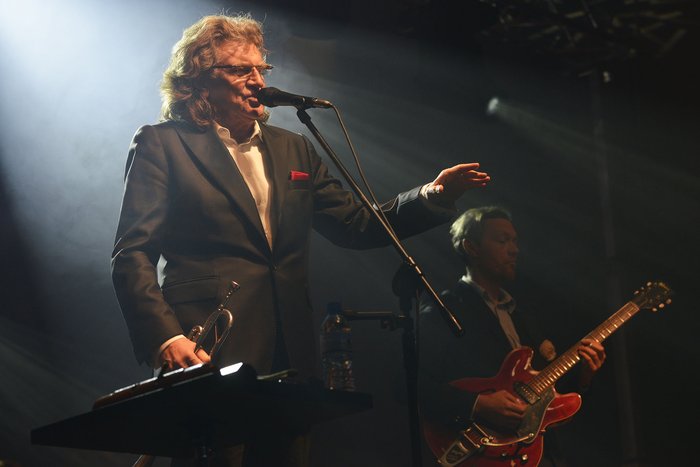 Idol of the young
Idol of the young
By 2013, nearly four decades had elapsed from his record début.
“Zbyszek rang me and said: 'Come to Soho, because I'm here with a young act Mitch&Mitch and I’m preparing the repertoire for a concert on Artur Rojek's OFF Festival',” Wojciech Trzciński recalled. “'This is complete madness, but everything has turned out OK. Come and see for yourself'.” But it really was great, the arrangements were based on what we had once worked out together. Sitting all around me were young people who knew all the lyrics and sang along.
“I am delighted by both the record and Mr Wodecki. He is a great artist and gentleman,” Mitch&Mitch leader Macio Moretti told me.
The next day they were off to Katowice.
“Two days later at 7.30 Zbyszek rings and says: 'You know old man, several score thousands were signing our songs, can you imagine that? Young people!' That gave him great pleasure,” Trzciński commented.
Two years ago, Jan Kanty Pawluśkiewicz invited Zbigniew Wodecki to sing Ty jesteś moją panią in a duet.
“That was long after his rendition of my Nieszpory Ludźmierskie (‘The Vespers of Ludźmierz’), Pawluśkiewicz recalled. “This time we were working a comical mode. The song should have been performed by a man and woman, but the two of us sang it, and that was right in sync with those new, liberated times. Zbyszek sang to me and I replied to him. We recorded it, but later he kept wanting to add something, came up with new arrangement ideas and what emerged was a five-voice finale phenomenally sung a vista! That was a revelation. It reminded me of the early Anawa when I wrote the song Niepewność serca (‘Uncertainty’) to the text of a Mickiewicz poem, which now may seem pretentious. Zbyszek perked up, his musical imagination kicked in, and in the recording, he added many voices, creating a beautiful chorale. It's worth reminiscing about and listening to,” mused Pawluśkiewicz.
Spring 2016
“Zbyszek phoned me and said he had won two Fryderyk awards for 1976: A Space Odyssey, the concert performance of our record from 1976. He mentioned me in every comment he made about that record to the media. Really comradely on his part,” remarked Wojciech Trzciński.
“A few days passed and again, he rang me: 'You know Wojtek, since we received several statuettes, we decided to give one Fryderyk to you, because as the co-composer you deserve it.' A splendid gesture. That was Wodecki from the word go. He tried to know all about the families and music of his colleagues, he remembered and respected them.”
“Apart from his phenomenal skills, he was also a great pal. He was a very good person. Whenever a need arose, he was always the first to offer assistance,” emphasised Jan Kanty Pawluśkiewicz.
“It all came from his Krakow upbringing,” noted Wojciech Trzciński. “He was permeated with a bohemian atmosphere because he matured culturally at the Piwnica pod Baranami, under the wing of Piotr Skrzynecki. He was immersed in the climate of Krakow jazz, theatre and literature. All this influenced Zbyszek's extremely rich personality. That is why he was what he was. He had transferred the high culture that had shaped him in Krakow to show business, and thank God for that! Thanks to Wodecki, show business became better and more colourful and got raised to a higher plateau.”
Author: Jacek Cieślak
Source: “Rzeczpospolita”

01.06.2017
